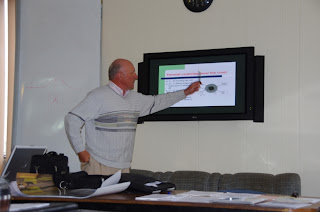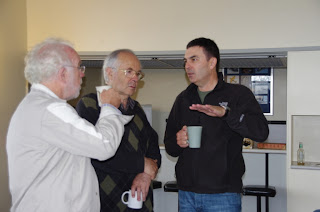We were planning on flying to Bacchus Marsh for the weekend to attend Glider Coaches Meeting but had to modify the plan due to weather. Driving down we figured we would have made it only to Ararat. Passed that clouds were lying on the ground and it was just bucketing. Walking from the car park to club building tuned out to be a complicated logistic task.
 |
| Bernard's lecture |
 |
| tea break discussions |
We talked about many different topics of instructing and coaching glider flying, shared our experience and tried to work out ways of improvement. It was very interesting to experience how different views of the same subject every individual has.
 |
| Ailsa and Jarek presenting safe ways of entering and leaving a thermal |
A very dynamic discussion on "instructing the basics" subject developed. The Australian way of doing things differs a lot from the European one. Our group consisted of people from different origins and backgrounds. We had people who learned to fly in Germany, UK, Poland and of course the land of OZ. The basic attitude in this country is to keep things easy and simple to attract more interest in gliding. Learning by doing is the preferred way. It works in most cases but in my humble opinion aviation doesn't always tolerate shortcuts.
I was trying to make a point on the importance of some basic theoretical preparation prior to the practical part and was really amazed by the resistance I encountered. Our group of about 20 clearly split into 2 parties: the "you gotta do some studying" and the "you'll figure it out as you go" group. To clarify again, I'm not talking about spending weeks and months over books with no reference to the practice. All I want to say is that there has to be some homework done up front to ensure better understanding and therefore a quicker and safer learning process.
I was trying to make a point on the importance of some basic theoretical preparation prior to the practical part and was really amazed by the resistance I encountered. Our group of about 20 clearly split into 2 parties: the "you gotta do some studying" and the "you'll figure it out as you go" group. To clarify again, I'm not talking about spending weeks and months over books with no reference to the practice. All I want to say is that there has to be some homework done up front to ensure better understanding and therefore a quicker and safer learning process.
The student learns in his first flight to keep up the speed and not go to slow. Why? The answer: "because you'll get killed" is not an answer. He also gets to know not to go to fast. Why? Does the same silly answer apply? To recover from a spin he is told among other things to push the stick forward. Why when the nose is all the way down and the glider is approaching the ground quickly? Wasn't it the other way around: stick forward houses get bigger, stick back they get smaller? Why is it different this time? What about the weather, airspace, instruments ... I could multiply examples like that for hours but this is not the point. The perception of a student in flight is very limited and in the early stages sometimes close to or even exhausted.
Saying that making a student read a book or attend a lecture could scare him off gliding is the silliest explanation one can come up with. Maybe a person who is not able to read or listen and understand shouldn't be learning to fly in the first place? There will be more much serious challenges up there anyways. Maybe it's not the books or lectures but us, ignorant instructors, who scare people off this beautiful sport?
You can teach a monkey how to move stick back and forth to make a glider take off and landing in ideal conditions. What you can't teach it though, is to quickly find an appropriate and knowledge based solution in an unexpected situation. Giving your student a package of good presented theoretical knowledge is giving him a chance to safely enjoy the sport for years to come. I wouldn't want to be in a situation where I would think: "maybe if I had explained that to him, he would be able to get out or even stay out of that trouble".
There is this famous saying:
"The emergencies you train for almost never happen. It's the one you can't train for that kills you"
Having the knowledge and understanding can help you figure something out to save your precious butt should an emergency occur... It's no warrant of course but a chance.
There is one last thing I'd like to point out and I will probably gain few new enemies.
Having a closer look at the IGC pilot ranking and several world championships results makes me think. The top pilots are usually originating from countries where theory courses have to be absolved prior to the practical part. It might be a part of the process of reaching the top levels.
http://igcrankings.fai.org/index.php?start=0&rowstodisplay=20
In the end it's not that complicated at all :-)
Saying that making a student read a book or attend a lecture could scare him off gliding is the silliest explanation one can come up with. Maybe a person who is not able to read or listen and understand shouldn't be learning to fly in the first place? There will be more much serious challenges up there anyways. Maybe it's not the books or lectures but us, ignorant instructors, who scare people off this beautiful sport?
You can teach a monkey how to move stick back and forth to make a glider take off and landing in ideal conditions. What you can't teach it though, is to quickly find an appropriate and knowledge based solution in an unexpected situation. Giving your student a package of good presented theoretical knowledge is giving him a chance to safely enjoy the sport for years to come. I wouldn't want to be in a situation where I would think: "maybe if I had explained that to him, he would be able to get out or even stay out of that trouble".
There is this famous saying:
"The emergencies you train for almost never happen. It's the one you can't train for that kills you"
Having the knowledge and understanding can help you figure something out to save your precious butt should an emergency occur... It's no warrant of course but a chance.
There is one last thing I'd like to point out and I will probably gain few new enemies.
Having a closer look at the IGC pilot ranking and several world championships results makes me think. The top pilots are usually originating from countries where theory courses have to be absolved prior to the practical part. It might be a part of the process of reaching the top levels.
http://igcrankings.fai.org/index.php?start=0&rowstodisplay=20
In the end it's not that complicated at all :-)




No comments:
Post a Comment